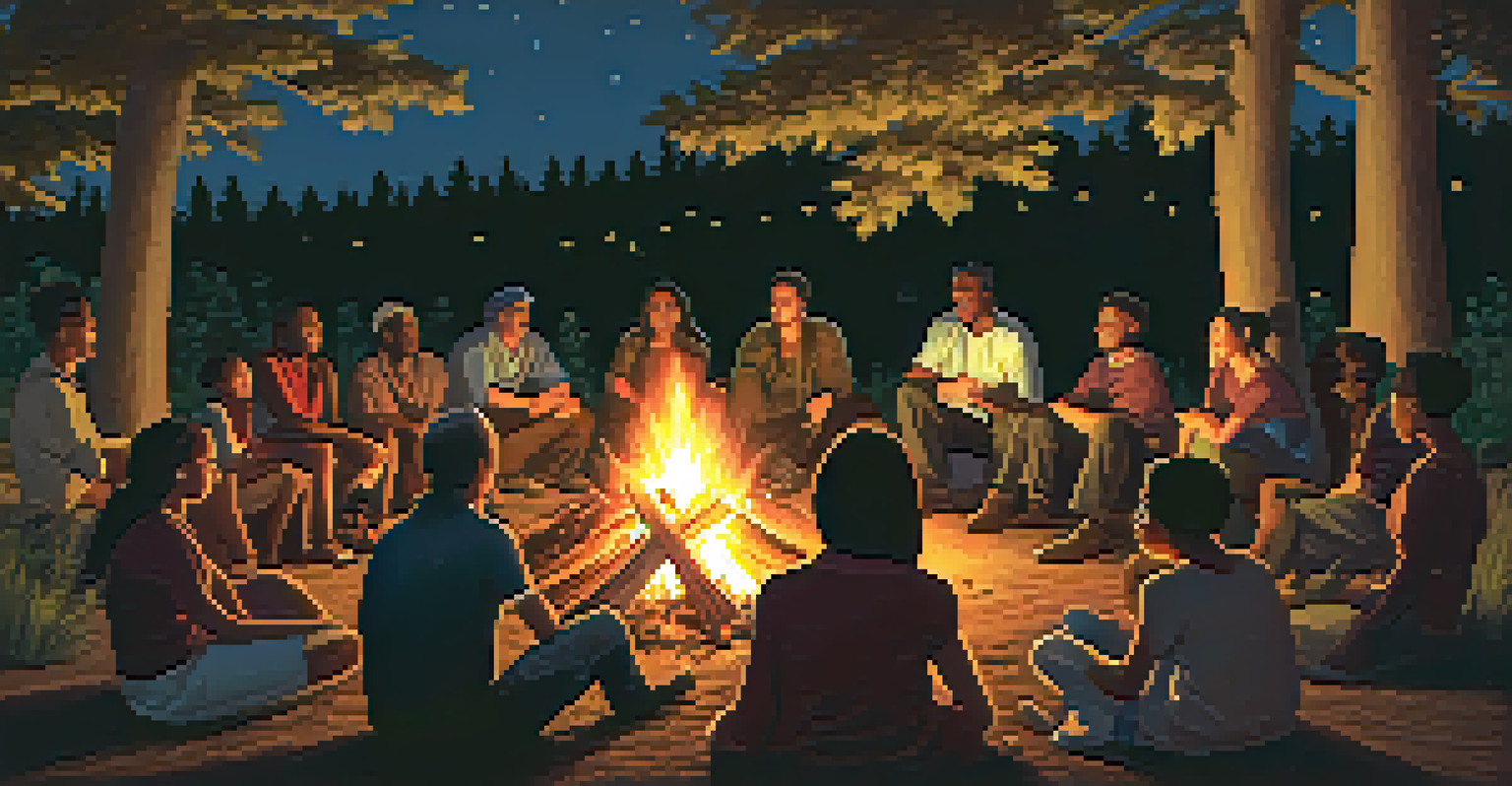The Influence of Ancestral Traditions on Contemporary Spirituality

Understanding Ancestral Traditions and Their Significance
Ancestral traditions refer to the customs, beliefs, and practices passed down through generations. They often reflect the values and worldviews of a culture, providing a sense of identity and belonging. For many, these traditions serve as a spiritual foundation, connecting individuals to their heritage and ancestors.
Tradition is not the worship of ashes, but the preservation of fire.
In various cultures, these practices can include rituals, ceremonies, and storytelling that celebrate the past. By honoring ancestors, individuals often feel a deeper connection to their roots, which can enhance their spiritual experience in contemporary settings. This connection is pivotal for many as it fosters a sense of continuity and purpose.
Moreover, understanding these traditions can help individuals navigate modern spirituality. By integrating elements of ancestral practices, people can create a more personalized spiritual journey that resonates with their unique backgrounds and experiences.
The Rise of Interest in Ancestral Wisdom
In recent years, there has been a growing interest in ancestral wisdom, particularly among younger generations. Many seek to reclaim their cultural identities by exploring the spiritual practices of their forebears. This resurgence often emphasizes the importance of rituals that promote well-being and connection to the earth.

This shift can be seen in the increasing popularity of practices such as herbalism, meditation, and traditional ceremonies that honor nature and community. These practices not only provide spiritual comfort but also foster a sense of belonging in an increasingly fragmented world. They serve as a reminder of the interconnectedness of all life.
Ancestral Traditions Shape Identity
Ancestral traditions provide a cultural foundation that fosters a sense of identity and belonging through customs, beliefs, and practices passed down generations.
Additionally, the accessibility of information through books, workshops, and online forums has made it easier for individuals to explore their ancestral roots. This democratization of knowledge has empowered many to incorporate these traditions into their contemporary spiritual practices.
Bridging the Gap: Modern Spirituality Meets Tradition
Modern spirituality often emphasizes personal experience and subjective truth, which can sometimes clash with established traditions. However, many practitioners find ways to bridge this gap by integrating ancestral practices into their spiritual routines. This fusion allows for a richer, more diverse spiritual experience.
In every conceivable manner, the family is link to our past, bridge to our future.
For instance, someone may blend mindfulness meditation with traditional rituals from their cultural background, creating a unique spiritual practice that honors both the past and the present. This approach not only respects ancestral wisdom but also adapts it to contemporary needs and lifestyles.
Moreover, this blending can lead to a deeper understanding of one's self and the world. By acknowledging the wisdom of ancestors while also embracing modern perspectives, individuals can cultivate a holistic spiritual practice that resonates with their values and experiences.
Rituals: The Heart of Ancestral Traditions
Rituals are a central component of many ancestral traditions, serving as a way to connect with the divine, the community, and the ancestors themselves. Whether it’s a seasonal celebration, a rite of passage, or a simple daily practice, rituals create a structure that can ground individuals in their spirituality. They offer a sense of continuity and purpose.
In contemporary spirituality, these rituals are often adapted to fit modern lifestyles while still retaining their essence. For example, a family might adapt a harvest festival by incorporating local foods and contemporary forms of expression, such as music or art. This adaptation allows for the celebration of tradition while making it relevant to today’s context.
Growing Interest in Ancestral Wisdom
Younger generations are increasingly reclaiming ancestral wisdom, integrating traditional practices into modern spirituality for well-being and community connection.
The act of performing rituals can also be deeply transformative. They create a space for reflection, gratitude, and connection, reinforcing the bond between individuals and their heritage. By participating in these rites, people often report feeling a greater sense of peace and belonging.
Storytelling: Passing Down Ancestral Knowledge
Storytelling is a powerful tool for conveying ancestral traditions and values. It serves as a means of preserving cultural identity and providing moral lessons that resonate across generations. In contemporary spirituality, storytelling can be an effective way to connect with the wisdom of the past.
Many spiritual seekers find comfort and inspiration in the stories of their ancestors, which can offer insights into their own lives. These narratives often highlight themes of resilience, love, and connection to nature, providing guidance for navigating challenges in modern life. They remind us that we are part of a larger narrative.
Furthermore, storytelling fosters community among those who share similar backgrounds. By sharing and listening to each other’s stories, individuals can deepen their understanding of their heritage and create a supportive network that celebrates their spiritual journeys.
Nature and Ancestral Practices: A Spiritual Connection
Many ancestral traditions emphasize the importance of nature, viewing it as a sacred space that offers spiritual nourishment. This connection to the earth is often reflected in rituals, teachings, and practices that honor the cycles of nature. In contemporary spirituality, this reverence for nature is more relevant than ever.
For example, individuals may engage in nature walks, plant medicine, or seasonal celebrations that align with the rhythms of the earth. By recognizing the interconnectedness of all living beings, practitioners cultivate a deeper sense of respect for the environment and their place within it. This not only enriches their spiritual experience but also fosters a sense of responsibility toward the planet.
Rituals Connect Past and Present
Rituals serve as essential links to ancestral traditions, allowing individuals to adapt and honor these practices in a way that resonates with contemporary life.
Additionally, nature often serves as a source of inspiration and reflection. Many find that spending time outdoors enhances their spiritual practices, allowing them to connect with their ancestors in a profound way. This bond reminds us that we are not separate from nature but are intrinsically linked to it.
Conclusion: The Future of Ancestral Traditions in Spirituality
As we look to the future, the influence of ancestral traditions on contemporary spirituality is likely to continue growing. The quest for authenticity and connection in an increasingly digital world has led many to explore their roots. This exploration often brings a renewed appreciation for the wisdom of ancestors.
Incorporating ancestral practices into modern spirituality not only enriches personal experiences but also fosters a sense of community among those who share similar backgrounds. By honoring these traditions, individuals can create a more meaningful spiritual journey that resonates with their unique identities.

Ultimately, the integration of ancestral traditions into contemporary spirituality is a beautiful dance between the past and the present. It allows us to honor our heritage while embracing the possibilities of the future, creating a rich tapestry of beliefs and practices that nourish the soul.